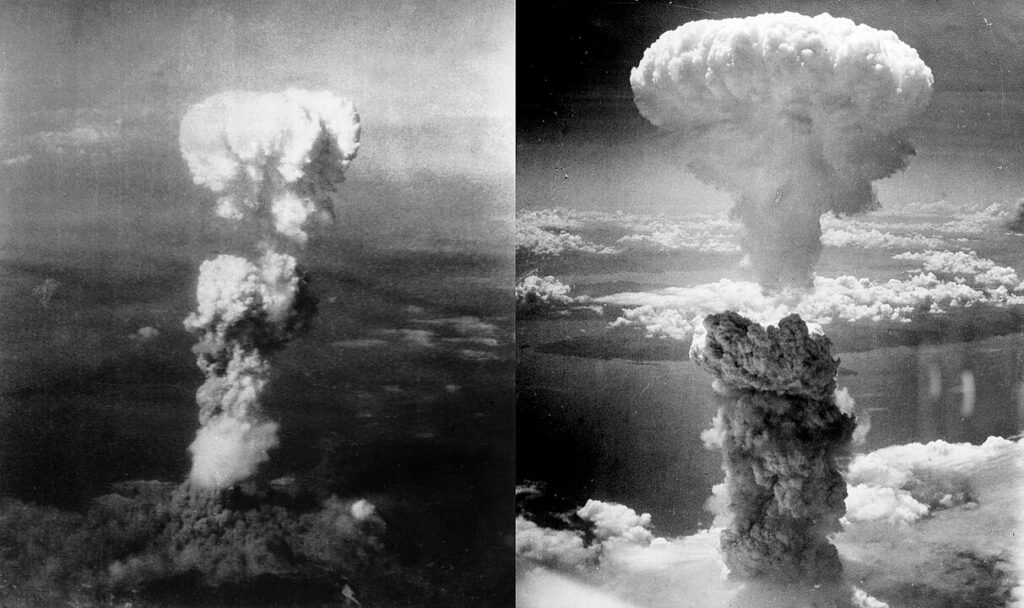
Atomic bomb mushroom clouds over Hiroshima (left) and Nagasaki (right). By George R. Caron / Charles Levy
At first impression, Hiroshima is a busy, hyper-clean and efficient city with a backdrop of hills and a river running through the centre.
A short walk from the station, where a very impressive super fast train from Tokyo pulls up exactly on time, will tell you a different story.
On both sides of the river is the Peace Park, a large, lusciously green area that houses an impressive museum of the Atomic Bomb.
On a baking hot day, it is full with people of all ages including school parties. An interactive display shows an aerial map of the city at 08.15 on August 6 1945.
The electronic graphic shows a blinding flash and pictures emerge of the devastation. All before us is destroyed and flattened, save the exhibition centre with its now famous dome, which survived because the explosion was directly above it. The blast went outwards, destroying everything else.
Photographs of victims, mutilated bodies, burnt trees and twisted metal adorn the walls. Each with a story of a life lost and unbearable pain for those who survived.
Hundreds of thousands died in Hiroshima and Nagasaki from the bombs and the cancers that followed. Probably two million lives have been lost by testing and the medical effects of radiation emitted.
Hiroshima’s bombing in 1945 did not serve any military purpose. Japan was already on the verge of surrender and was reaching out via the Soviet Union for an end to the conflict.
This was well known to the US and Britain at the time. In reality, it was the last bomb of WWII, and the first bomb of the cold war. The US had spent $2 billion on the Manhattan Project to develop the bomb, despite the opposition of many scientists including Albert Einstein who had initially supported it. They opposed it because they realised the indiscriminate killing of civilians was then, as it is now, an inevitable consequence of nuclear war.
The horrors of the atomic bombings still haunt the now aged survivors. Known as the Hibakusha, they were awarded the Nobel Peace Prize for their work in pleading with the world to abolish the nuclear weapons that had killed their friends and family.
A long and moving presentation, with music and song led by the Hibakusha, was held in the enormous City Sports and Concert Hall on Monday afternoon.This accompanied the 2025 World Conference against Atomic and Hydrogen Bombs, an annual event organised by Japan Council against Atomic and Hydrogen Bombs (Gensuikyo).
We were briefly interrupted by a nasty and noisy far-right motorcade, which passed our conference. This was a timely reminder of the global threat of the far-right, and the importance of uniting behind a programme of equality, inclusion and peace.
The conference heard from peace campaigners from all round the world of their attempts to make a reality of the treaty for the end of all nuclear weapons, and for an end to the current wars in Ukraine, Sudan and Palestine.
The declaration agreed called for a ceasefire, and in the case of Gaza the removal of the occupying forces and bringing an end to the genocide.
The Nuclear Non Proliferation Treaty has had some success with the creation of nuclear-free zones, such as Africa and Latin America. Where it has been less effective is on the declared nuclear weapons states renewing their nuclear arsenals.
In a lengthy seminar, Anne Walker (an ex-US military turned peace activist), MEP’s Mark Botenga from Belgian Workers Party and Martin Scherdewan of Die Linke, and Japanese Communist Party Chair Kayuo Shii, discussed the huge growth in arms spending, the renewal of nuclear systems by the five declared states, and the existential dangers of nuclear war.
The more that is spent on nuclear weapons, the less that is spent on health, housing and education. The galloping global arms race only produces one winner: the hugely profitable arms manufacturers who manipulate policy and markets, at the expense of the social needs of people in all countries.
We should learn from Japan, which has remained a non-nuclear state. As the only country to have experienced atomic bombings during wartime, Japan has been leading the international campaign for nuclear disarmament. The rest of the world should take note.
Eighty years on from the horrors of Hiroshima (and Nagasaki), and the weapons now available are many times more powerful. There are no winners in nuclear war; only burnt bodies, a destroyed environment and a nuclear winter for the whole planet.
After 80 years, we need to make the Global Ban Treaty a reality — and rid this world of nuclear weapons once and for all.
Source: Morning Star